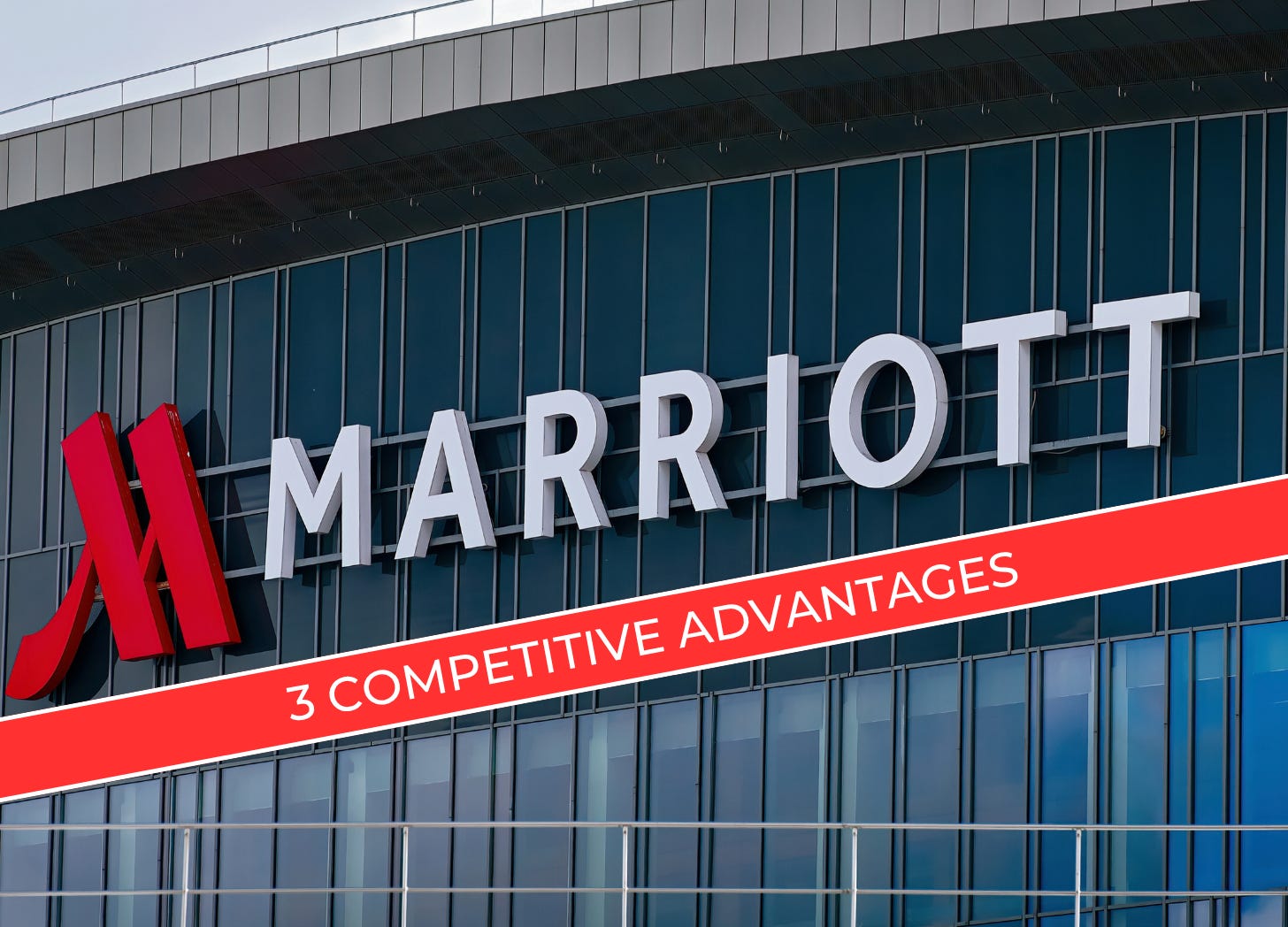Marriott's 3 Competitive Advantages
How Marriott leverages its brand to build stronger competitive advantages
Marriott, renowned for its consistently high-quality accommodations and amenities, has built a strong brand that caters to a wide range of travelers. From luxury brands like The Ritz-Carlton to more affordable options like the Marriott Courtyard, Marriott offers top-notch service at various price points.
In the fiercely competitive hotel industry, branding alone is not enough to secure long-term success. One wrong move can destroy decades of a carefully cultivated reputation. Marriott understands this and leverages its brand to create stronger competitive advantages, such as barriers to entry, switching costs, and network effects.
Barriers to Entry
There is an actual physical limit to how many hotels can be built in an area. Then, Marriott takes advantage of this scarcity to build a higher barrier to entry with its management and franchise agreements. The average contract starts with 20-year terms with the ability to renew for up to 50 years. Marriott can lock up a prime location and block out competitors for decades.
Switching Costs
Once a property is under contract, Marriott creates switching costs for the hotel owner so that they want to keep renewing their management & franchise agreement with Marriott.
The first cost to switch would be a loss of customer traffic and revenue. If a hotel operator leaves Marriott, they’re also leaving Marriott’s reward program, which is a big source of bookings.
In 2022, over half of our global room nights were booked by Marriott Bonvoy members. We strategically market to this large and growing guest base to generate revenue.
- 2022 Annual Report
Do you leave Marriott knowing that your bookings could drop by 50%? Will you join another major hotel brand? Do they have a similar loyalty program? Will it bring in the same amount of traffic & revenue?
The hotel owner is the one carrying the debt on the hotel. A major disruption to bookings could put the hotel in financial distress. If everything is working well with Marriott, why would a hotel owner leave Marriott and put their asset at risk?
The second switching cost is incurred if a hotel owner wants to leave Marriott and join another major hotel brand. The hotel owner may have to invest in new amenities, property upgrades, and room remodels to meet the requirements of the new management company. If the hotel owner already meets Marriott’s requirements and if Marriott is delivering on their end, then why incur the extra costs to switch brands?
Customer Switching Costs
Marriott also creates the lock-in switching cost for customers with its loyalty program.
The more points you earn in Marriott’s loyalty program, the more likely you are to book all your travel through their system to redeem current points and to earn more points for future trips.
Marriott essentially “locks” you into their ecosystem because not using your reward points makes you feel like you’re losing money. And Loss aversion is a big motivator when we make financial decisions.
Network Effects
Bonvoy is the largest hotel loyalty program in the world, and its size creates small network effects for Marriott.
The more members Bonvoy has, the more appealing a contract with Marriott is to hotel owners. The more hotels and locations on the Bonvoy platform, the more valuable it is for its members. This creates self-reinforcing network effects.
MGM Resorts, with over 40,000 rooms in Las Vegas, wanted access to Marriott’s loyalty program and the revenue it brings.
Beginning in October, several MGM Collection with Marriott Bonvoy resorts will be available for booking on Marriott’s robust digital platforms, including Marriott.com and the Marriott Bonvoy mobile app, with all properties expected to be available by the end of the year.
The addition of another 40,000 rooms in Las Vegas increases the value of Marriott’s loyalty program for its customers too.
If you’re booking a trip to Las Vegas, your first stop is Marriott’s Bonvoy platform to find any membership deals or to use your reward points.
Investing in Marriott means investing in a company with a strong brand, formidable barriers to entry, enticing switching costs for both hotel owners and customers, and the benefits of network effects.



